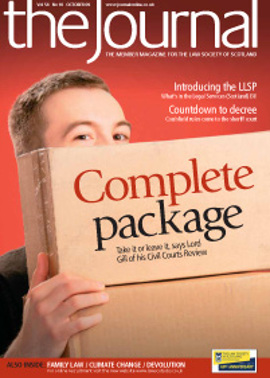Divorce for gender change

For nearly 20 years there was only one ground for divorce in Scotland – that the marriage had broken down irretrievably (Divorce (Scotland) Act 1976, s 1). All that changed though with the Gender Recognition Act 2004, which amended the 1976 Act to introduce an additional, new, ground for divorce – the issuing of an interim gender recognition certificate after the parties married (1976 Act, s 1(1)(b) as amended). So what is an interim gender recognition certificate, who can get one and how do you deal with it, at a practical level in the sheriff court?
Interim certificates
The 2004 Act, which is a UK-wide piece of legislation, allows transsexual people to gain recognition of their acquired gender (which matches their self-perceived gender identity, rather than the gender identity they had at birth). A person wishing to undergo a transition to the opposite gender can apply to the Gender Recognition Panel (“GRP”) for a gender recognition certificate (“GRC”). If a GRC is granted, the applicant is then considered in the eyes of the law to have become their acquired gender and they can obtain a new birth certificate. A GRC cannot however be granted if the person is married, because it is still not possible to have a marriage between two people of the same gender. The 2004 Act therefore provides a mechanism for the person to get an interim GRC which allows them to get divorced, and the full GRC then follows automatically on divorce being granted.
The interim GRC, then, is issued purely for the purpose of allowing the applicant to end their marriage – it has no legal significance beyond this. The writer has recent experience of such an application in Edinburgh Sheriff Court, and there are a number of practical learning points that may be of interest to practitioners who have such applications in future.
The panel and the court
There are few prescriptive rules on how these applications are to be dealt with. The initial writ should be drafted in the usual way with, in addition to the usual information, the narration of the date of issue of the interim GRC. The interim GRC (or a copy certified by the Gender Recognition Panel) then needs to be lodged with the initial writ. Warrant cannot be granted without the interim GRC being produced: ordinary cause rule 33.9A.
There is a dearth of direct provision in the 2004 Act and the relative SSI (Act of Sederunt (Ordinary Cause Rules) Amendment (Gender Recognition Act 2004) 2005 (SSI 2005/189) on the practicalities of these applications. The SSI does not directly require the sheriff clerk to contact the panel to seek confirmation that the certificate is valid before warrant. It is submitted that early liaison between the panel and the court is helpful (the writer’s experience has been that the panel is also hugely helpful).
The GRP clearly does not expect divorce to be granted without having given confirmation that the interim GRC is valid, and has an expectation that the court will contact it before extract is granted to co-ordinate in relation to the issuing of the GRC (which is done by the court, not the GRP). As soon as the GRP receives written notice from the court that divorce has been granted, it will issue the full, undated, GRC to the court. This must then be stamped and dated by the court and issued on the same day as the extract decree of divorce. A photocopy of the completed GRC is then to be sent back to the GRP by the court, which then informs the General Register Office of the applicant’s change in gender. The court should therefore be sending out the extract decree of divorce together with the GRC to the pursuer.
Although the 2004 Act is an important step in the recognition that transsexual people rightly demand, the decision to divorce is a painful and sensitive decision for any transsexual person to make. Many remain in stable marriages, have no desire to divorce and do not want their spouse to lose inheritance and pension rights as a consequence of their application for a GRC. Another reason that it’s time for same-sex marriage?
Gender recognition panel – t: 0845 355 5155;
e: grpenquiries@tribunals.gsi.gov.uk
Nicola Matthew is a solicitor with Sheehan Kelsey Oswald, Family Law Specialists
In this issue
- The Combined Standard Clauses (2009 edition)
- Preserving a legal inheritance: settlement rights in the "Occupied Palestinian Territories"
- The European Court and the duty to investigate deaths
- Chief Executive's SGM address
- Shelter's online resources
- Musical copyright and contract
- The international swap shop
- Headline fortnight
- The Gill Report? What's not to like?
- Solicitor advocates and conflicts of interest
- Settlement in the West Bank
- Package deal
- RoS = economic value
- Defining the future
- Global leader?
- Dog's chance
- Coulsfield rules OK
- Money and your life
- Experts on the case
- At the hub, 10 years on
- Guardians: don't look to the Fund
- From the Brussels office
- Ask Ash
- Making the most of ABS
- Planning for growth
- The perils of posting
- ARTL: friend or foe?
- Where privacy prevails
- How was it for you?
- Agreeing rescues with creditors
- Adopting new solutions
- Divorce for gender change
- Scottish Solicitors' Discipline Tribunal
- Book reviews
- Website review
- A safe pair of hands tops the bill
- Law out of step






